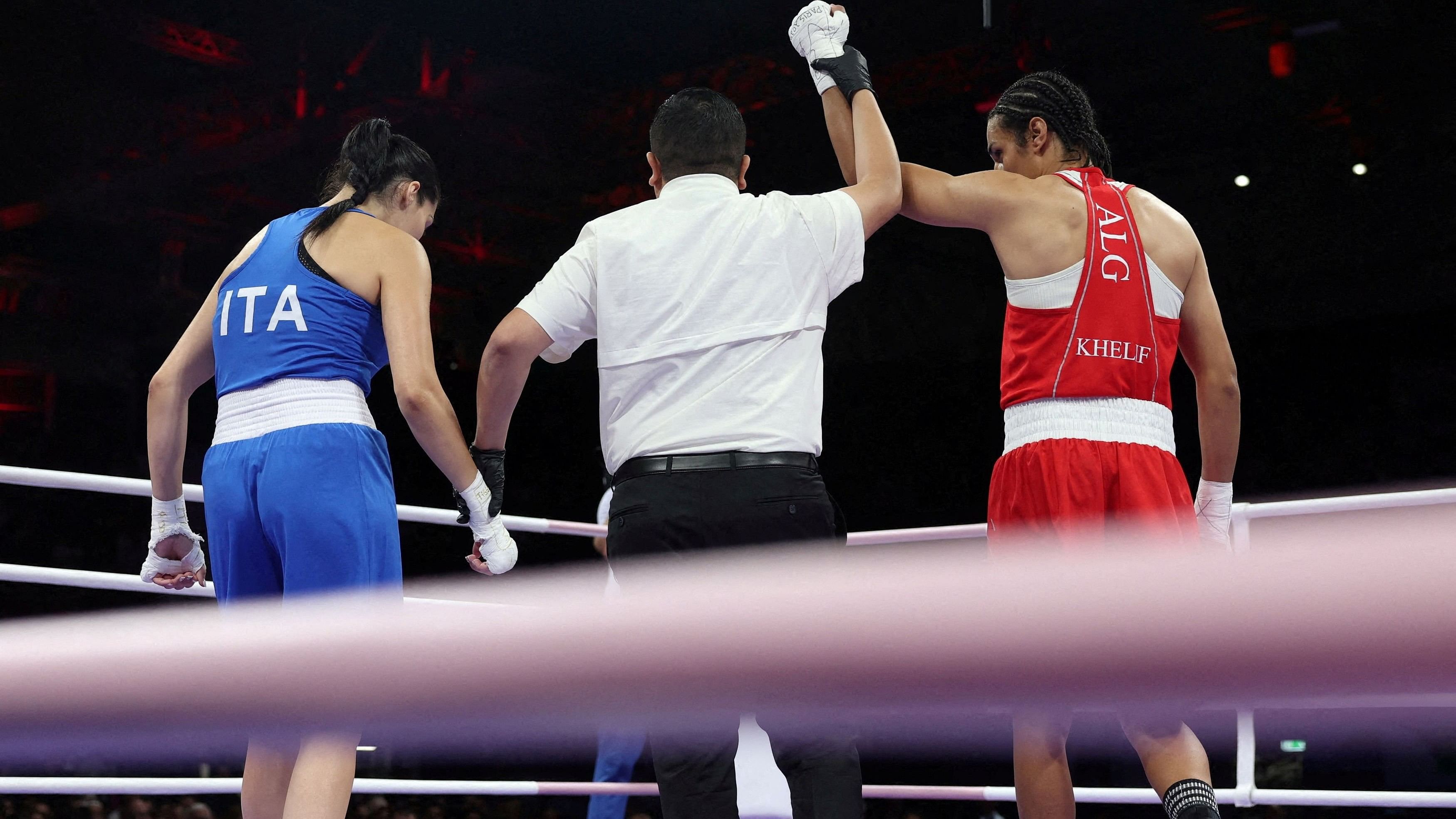
Imane Khelif of Algeria won against Angela Carini of Italy in the women's boxing 66 kg category in the Paris Olympics 2024.
Credit: Reuters
Before you ponder variations of an answer to that question, remember there is no right response because one needn’t be ‘allowed’ to be anything.
Everyone can be what they want to be should they choose to be, and the bystanders in their lives could do well to accept them for being so.
As ideological as that sounds, the world is glacially moving — maybe a little confusedly — towards acceptance of what one is, and isn’t as bent on what one should be.
Sports, sadly, doesn’t leave much room for this nuance to swell. While it allows people to wear their persona generously, athletes still have to work within ancient, written and unwritten confines, and occasionally become the subject of and be subjected to toxic vitriol.
In sports, a strong woman is respected and revered. In sports, a woman too strong could very well be called a ‘man’ and denigrated by their own.
That is the crux of the problem that hogged much of the spotlight during the Paris Olympics. Algeria’s Imane Khelif and Taiwan’s Lin Yu-ting went on to win gold in their respective weight categories in women’s boxing.
All this while, they were being called ‘men’, ‘transgender’, ‘cheats’, and things so unsavoury it’s unbecoming of us as a race, and all because they punched harder and didn’t fit the optical stereotype of a woman.
That’s perhaps why even tennis great Serena Williams was subject to this treatment occasionally! We should have learned our lessons from fifteen years ago when a teenage runner from South Africa was ‘stripped of her gender’ in public view. Evidently, we have not picked up on Caster Semenya’s case. It’s one where she nearly went so far as to show her vagina as proof of being a woman to the officials after her treatment at the 2009 World Championships.
The International Olympic Committee (IOC) seems to have worked it out, though, and that’s good news for Khelif and Yu-ting. There are some holes in their policies which can do with some work, but that is not of immediate concern. What is though, is how quickly we reduced the very essence of these two world-class athletes and turned their lives into a circus for everyone to enter without fee.
At the heart of all things confusing is the International Boxing Association (IBA). They hastily called for a press conference midway through the Games and announced that Khelif and Yu-ting had failed a sex verification test last year and were subsequently banned from the World Championships in New Delhi. Lest we forget, none of those tests have been made public yet. So, we have the words of Kremlin/ Vladimir Putin-backed IBA president Umar Kremlev’s words to go by. Right.
That the IOC and the now-banned IBA don’t get along is rather well chronicled so there is no point in knowingly diving into that hell hole. However, their protracted and open dispute has certainly played a part in complicating this gender debate.
In the aftermath of IBA’s announcement, the IOC, which runs boxing at the Olympics now, said IBA’s testing methods were arbitrary and “so flawed that it’s impossible to engage with it”. IOC stressed that both boxers were assigned female at birth, identified as women, and are thus eligible to compete in women’s competitions.
The IOC tests for testosterone and dives into gynaecological testing should it come down to it.
The IBA had, until last year, done the chromosome test.
The concern with the latter is that some women, assigned female at birth and identifying as women, have conditions called Differences of Sex Development (DSD). This involves an XY chromosome pattern or natural testosterone higher than the typical female range.
Basically, these are the chromosomal patterns of men. However, people with DSD can be women despite the same pattern.
Moreover, science does not conclusively prove that having DSD and/ or higher testosterone than other women gives them an undue edge.
That’s, again, just a masculinity-asserting narrative stitched by men because the hormone is in abundance in men while not so in women. And sport, as we know, is run by men, who are oblivious to biological conditions on the spectrum.
Male or female isn’t as simple as black or white, and we should be so conscious of that before setting off on virtual witch hunts.
Take Polish sprinter and former world record holder Ewa Kłobukowska for example. She failed a gender verification test and was banned from competing in professional sports.
Turns out, she had genetic mosaicism, an abnormality where one’s cells have a different genetic makeup, which has varying effects on development.
This was back in 1967, and we seem to have made little progress.